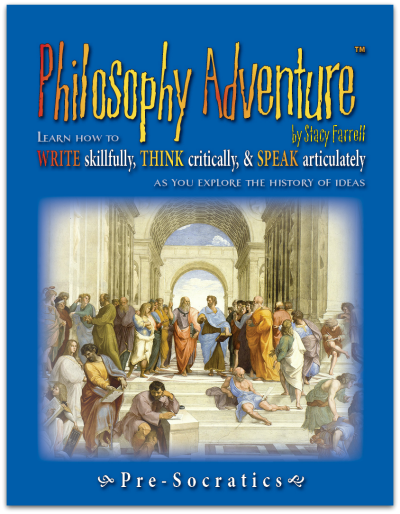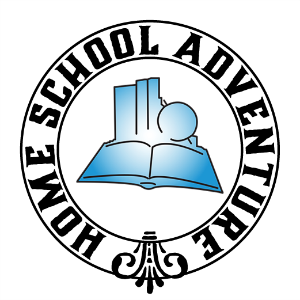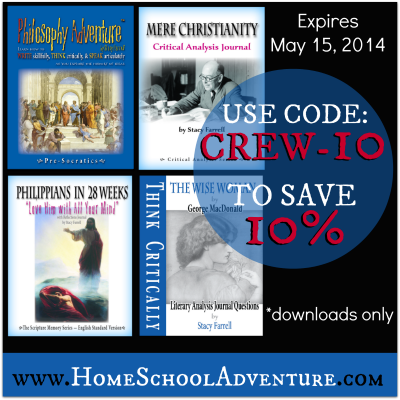Thinking. Writing. Speaking. Biblical worldview. These are all things I want to teach well in our homeschool. Therefore, I was excited to get the opportunity to review Philosophy Adventure from Home School Adventure Co..
The program includes:
- Reader
- Student Workbook
- Teacher's Resources
There are a few different options for purchasing, ranging from a printed and CD combo to a complete digital downloadable version. I received the digital download version, and it is priced at $39.95.
Philosophy Adventure revolves around the Reader. This is a lovely, full color book that contains the stories, articles, and assignments. For example, the first lesson is on Thales (the father of Western Philosophy, and to whom the quote "Know thyself." is attributed. It begins with explaining who Thales is and why he is important. There is a nice sidebar that gives pertinent information, like when he lived and who his contemporaries were (Ezekiel, Buddha, and Pythagoras, are a few, if you were wondering).
Philosophy Adventure revolves around the Reader. This is a lovely, full color book that contains the stories, articles, and assignments. For example, the first lesson is on Thales (the father of Western Philosophy, and to whom the quote "Know thyself." is attributed. It begins with explaining who Thales is and why he is important. There is a nice sidebar that gives pertinent information, like when he lived and who his contemporaries were (Ezekiel, Buddha, and Pythagoras, are a few, if you were wondering).
There are colored coded sections within each lesson. The first is the red "Write" section. This contains writing assignments. In the first lesson, the student is asked to grapple with big questions, like "Where did I come from and why am I here?". There are no wrong answers, and the student is told to set a timer for 30 minutes. They are instructed to read their answers aloud when finished, and to make sure they are true for what they believe today.
The second is the green "Think" section. In this section, students read about what Thales thought. It discusses when Thales lived, and the possibility that he was exposed to Hebrew scriptures. In the assignment section, students are challenged to develop their memorization skills, especially for the purpose of memorizing the Bible.
The third is the brown "Speak" section. In this section, students are exposed to more of Thales' ideas. In the assignment for this section, students are told to answer 3 questions in their "Write Think Speak" journal. One of these questions is "Can you identify a prize for which you would be willing to suffer?". Again, not an easy question, but one that will truly cause the student to think.
Following the Write, Think, and Speak sections are sections that include geography, additional information on the philosophers and their contemporaries and world, and a section that includes writings by philosophers. The final section analyzes the information within the context of a Biblical worldview.
The other major portion of this course is the Student Workbook. This workbook contains questions about the readings in the Reader, along with a map to color. This map also includes a space to record facts learned in the Reader about each place on the map. There is also a creative writing assignment. For the Thales section, the student is asked to describe seeing an old man falling into a well. The assignment gives the student several tips to help them get started, and they are instructed to set the timer for 15 minutes. The Student Workbook also contains the "Write Think Speak" journal referenced above. This gives the student a place to write and answer the questions in the Reader. You have the option of printing the workbook and having your student handwrite the answers, or having your student type the answers into the workbook before printing. In order to do the mapping assignments, you will need to print the workbook at some point.
The final portion of the program are the Teacher's Resources. This portion includes memory cards, timeline resources (printable timelines & images), map keys, & quizzes.
While this program is designed for grades 6-12, I would be hesitant to use it with a 6th or 7th grader, and possibly some 8th graders. I think that students who are in high school will get far more out of this program than middle school students. Depending on how you use the program, you can award the following high school credits:
I used this with Luke (9th) and Ezekiel (8th). There is scheduling help in the front of the Reader, so it was easy to decide how much to use every day, and the program can be used either four or five days a week. Since I received the digital download version, I had the boys download the Student Workbook and Reader to their laptops. They read the Reader on their computer, and I had them type their answers in the workbook. I had technical difficulties when trying to print, so they didn't actually get the opportunity to do the map work, though they were able to answer the questions about the map. I liked that it wasn't time intensive for me; I could tell them what to do each day and they were able to do it without assistance from me.
The only thing I would change is the layout of the Student Workbook. It is split into two sections--the notebook & mapwork section, and the "Think Write Speak" journal. There are assignments for each lesson in the reader in both sections, and I think it would be so much easier to use if the assignments for each lesson were together. Of course, you can do this yourself if you print the workbook.
I love the way Philosophy Adventure made the boys think. I've mentioned before that I think knowing your worldview is very important, and I love the way this program had them think through what they really think. It is a challenging program (it's easier not to think, after all), but oh, it's so very important. Luke & Ezekiel both liked the program. They both think it is challenging, but well worth their time, and would like to continue.
Home School Adventure Co. is offering a 10% discount on download purchases. This discount expires May 15, 2014:
Check out Home School Adventure Co. on:
Google+






No comments:
Post a Comment